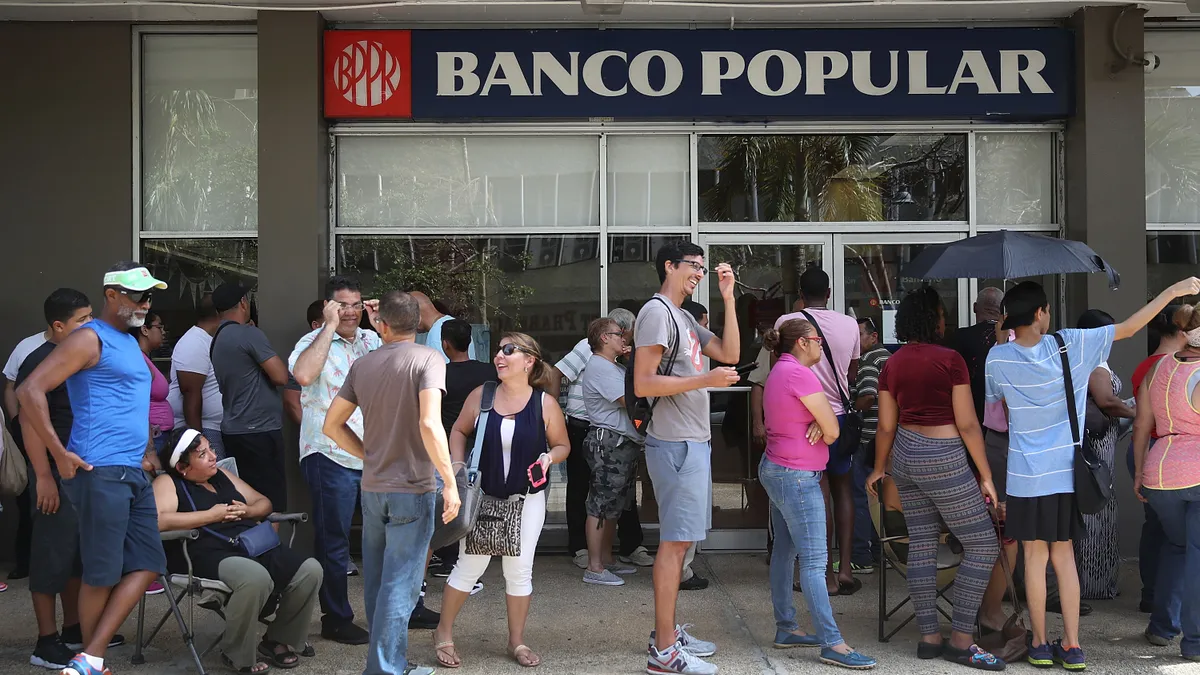Puerto Rico’s Banco Popular on Thursday named its chief operating officer, Javier Ferrer, as its president, effective immediately, according to a press release.
Little else will change. Ferrer isn’t being given any new responsibilities. (He’ll “continue to oversee all business units” in Puerto Rico, the mainland U.S. and the Virgin Islands and “direct Popular’s strategic planning and data analytics functions,” the company said.)
He will continue to serve as COO, in addition to being president. And he’ll still report to CEO Ignacio Alvarez, who until Thursday held the president title in addition to being chief executive.
Nor is Alvarez offloading any oversight. (“The corporation’s administrative, communications, finance, risk management, security, legal and technology functions will continue reporting directly to the CEO,” the company said.)
Still, whenever the title of president is transferred onto someone, it takes the air of a succession plan — whether that’s intended or not. Observers took note in 2019, when Citi’s then-CEO Michael Corbat named Jane Fraser as president. She would be tapped as the bank’s next CEO within a year.
Fraser’s journey may be truncated in comparison with the typical succession proving ground. Morgan Stanley’s three-way succession race spanned nearly 2½ years before the bank named Ted Pick to succeed James Gorman as CEO. It’s been three years and counting since JPMorgan Chase appeared to begin grooming Marianne Lake and Jennifer Piepszak to succeed Jamie Dimon.
Yet, as recently as last month, the bank made clear that those executives are not in JPMorgan’s “near-term” strategy.
JPMorgan “continue[s] to develop a deep bench of potential leaders who can execute the Firm’s strategy and enhance our strong culture,” the bank said in its April proxy statement. But “should the need arise in the near-term, we view [President Daniel] Pinto as a key executive who is immediately ready to fulfill the responsibilities of the CEO.”
Pinto has served as an immediate placeholder before. He was one of two co-presidents who ran the bank for roughly a month when Dimon had emergency heart surgery in March 2020. (The other, Gordon Smith, has since left the company.)
If naming someone president is a succession move, it’s notable how many succession plans have rolled out in May, of all months.
Before Popular’s announcement, U.S. Bank this month named Gunjan Kedia, previously the Minneapolis-based lender’s vice chair of wealth, corporate, commercial and institutional banking, as president — essentially making her the front-runner to succeed Andy Cecere as CEO.
Morgan Stanley and JPMorgan’s aforementioned succession races? Both launched in May (2021).
Ferrer may not be Popular’s long-term post-Alvarez option. At a glance, the two executives’ careers have an extraordinarily similar trajectory. Both were founding partners in the law firm Pietrantoni Mendez & Alvarez. Alvarez joined Popular in 2010 as chief legal officer. Ferrer succeeded him in that role when he joined the bank in 2014 and Alvarez became president and COO. Alvarez took the CEO role in 2017. Ferrer, meanwhile, moved to COO in 2022.
There are presidents, too, who may be seen as part of a package alongside a CEO. At the height of anti-David Solomon sentiment within Goldman Sachs — as the bank shed 3,200 positions last January; some would say belatedly — some of the bank’s partners, behind closed doors, allegedly began discussing who could replace Solomon as CEO. President John Waldron reportedly was seen by Solomon opponents as too close to the CEO’s strategy to be a viable successor.
Waldron’s attributes, however, have won the praises of analysts — notably, Mike Mayo of Wells Fargo who noted, in a retrospective of Goldman’s 25 years as a public company, that the tenures of CEOs Hank Paulson and Lloyd Blankfein were often marked by silence in earnings calls and a dearth of publicly shared financial targets.
“It wasn’t until John Waldron that I actually had … a good meeting at Goldman Sachs,” Mayo told the Financial Times this month.
One popular narrative that goes against the idea of Ferrer succeeding Alvarez is that they’re close in age. Alvarez is 65; Ferrer, 62. So the likelihood of a long Ferrer era, if it comes to pass, is not high.
A spokesperson for Popular made clear that Alvarez is not yet ready to hand over the keys to the bank. Alvarez will “continue working fully, leading Popular as CEO and in close collaboration with [Ferrer] and … the management team,” a bank spokesperson told American Banker.
Ultimately, Ferrer may be seen as an Alvarez-era figure at Popular. And that’s OK, too. He’s still president — and that’s something.




















